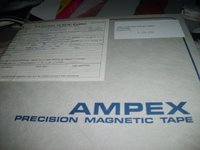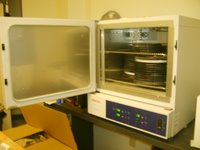 The task seems enormous when you consider that shows were archived on tape as late as the mid-nineties. Every time I went into the library, I’d close my eyes and hope that what I needed would be available in digital format. If it wasn’t I wouldn’t spend triple the time getting a reel, bringing it to an engineer, finding the correct segment (no track markers remember) and finally, digitally uploading it into the network. I only learned to thread the tape into a player myself a few days ago. The task reminded me of being one of the highly lauded AV helpers at my elementary school and negotiating the labyrinthine twists of the classroom projector. Knowing how to do this speeds up the process and annoys the engineers less. Now, I can find the correct place on the tape myself, mark it with special non-sticky paper and hand it to the engineer with less fuss.
The task seems enormous when you consider that shows were archived on tape as late as the mid-nineties. Every time I went into the library, I’d close my eyes and hope that what I needed would be available in digital format. If it wasn’t I wouldn’t spend triple the time getting a reel, bringing it to an engineer, finding the correct segment (no track markers remember) and finally, digitally uploading it into the network. I only learned to thread the tape into a player myself a few days ago. The task reminded me of being one of the highly lauded AV helpers at my elementary school and negotiating the labyrinthine twists of the classroom projector. Knowing how to do this speeds up the process and annoys the engineers less. Now, I can find the correct place on the tape myself, mark it with special non-sticky paper and hand it to the engineer with less fuss. I stumbled across the more obscure part of this story when I had to order a tape from outside of the building. The audio I needed came from a Morning Edition show from April 1981. Tapes from that year are kept at another site, since the library is small and the archive now spans 30 years. I placed my order and was advised that the time needed to get it to me would include a period of baking. What?! Baking?
Yeah, baking. So, here’s what happens. Older tapes, when they’ve sat on the shelf for a number of years, develop an uncomfortable form of tape dermatitis—“sticky shed syndrome.” This means that the tape binder, the glue used to connect the magnetic and plastic parts of the tape, has absorbed water over its long shelf life. This makes the tape stick to the player’s heads and renders it unplayable—or at least the sound quality isn’t great.
I did a little research on the topic, talked with a couple librarians and found out some of the back story on this insidious disease.
Not all tapes develop sticky shed syndrome. The tapes with the sub-par binder were manufactured in the mid-seventies to late eighties. Why does the tape from those years become sticky, you ask? The answer involves whale blubber.
WHALE'S REVENGE
At least part of the answer lies in that great '70s crusade, to 'save the whale'. As a result of the environmental lobby in the US, tape manufacturers Ampex were stampeded into abandoning their traditional whale oil tape-binder (the binder is the material used to fix the tiny particles of magnetic oxide to the tape's flexible backing tape). Ampex's synthetic substitute, perhaps because it was formulated without the normal research and development, has since undergone some form of chemical breakdown, and at the same time, absorbed moisture from the air. The problem was identified, and improved formulations substituted to clear the problem, but that still left thousands of reels of tape around the world that were literally rotting away. What, if anything can you do to recover material archived in this way
The answer that this article and our friendly NPR library gave is to bake the tape! Yes, literally stick it into an oven. This
 removes the moisture that’s built up in the binder and makes the tape playable again. Sound easy? Well, there are a couple of catches. For instance, the tape should be baked at a steady 130° F, which means you need an accurate oven. NPR uses a laboratory oven for the job.
removes the moisture that’s built up in the binder and makes the tape playable again. Sound easy? Well, there are a couple of catches. For instance, the tape should be baked at a steady 130° F, which means you need an accurate oven. NPR uses a laboratory oven for the job.And the process takes time—around 4-6 hours. You absolutely can’t use a microwave oven either and the biggest catch is: this doesn’t fix the tape for ever, just a couple months at best.
Although this is a fascinating look into the obscure world of audio archiving, for me, knowing this story brings up all sorts of questions about the longevity of information. As one librarian remarked to me, stone tablets are probably the best way of preserving something. They are not, however, easy to store or cost effective. CD’s are cheap and small but they have only been around for 25 years and no one knows what kind of problems they might develop in another 20 (digital psoriasis perhaps?). In fact, archivist still prefer magnetic tape as a superior method for audio archiving, with a binder resistant to sticky shed of course. Also, as any computer users knows, the larger problem with archiving media digitally is the frequent failure of electronic storage. Computers crash, hard drives are wiped clean and no amount of baking can bring them back.
For information on baking tapes you can go here for all you ever wanted to know and more about creating piping-hot and usable tape.
-Joanna Stein